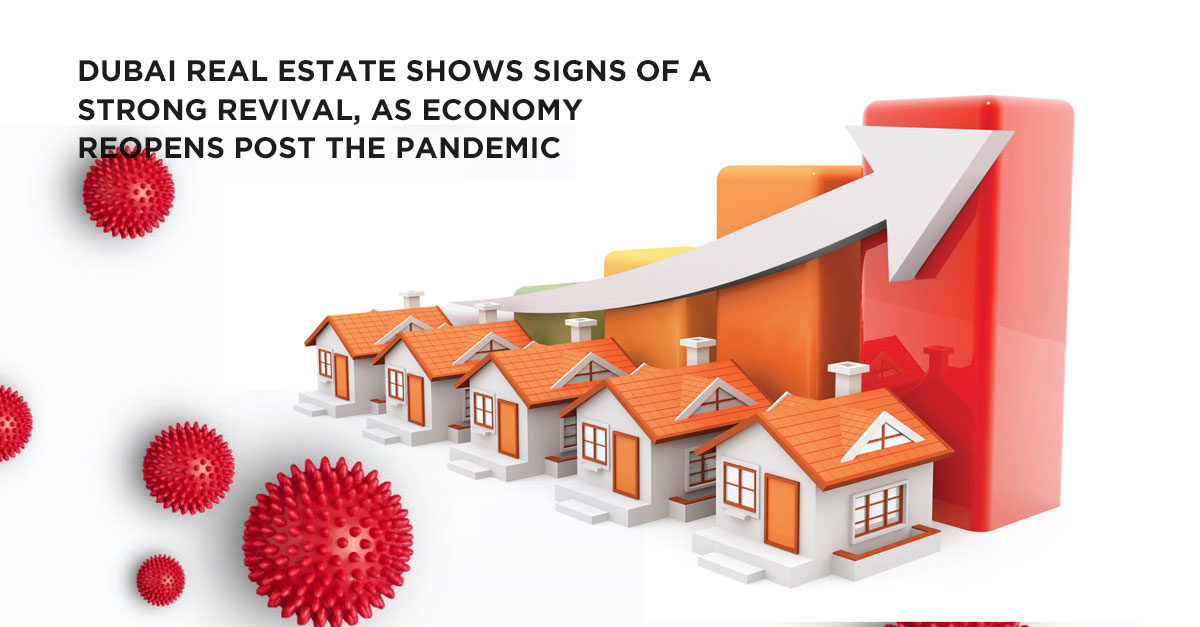Dubai real estate shows signs of a strong revival, as economy reopens post the pandemic
The UAE has been diversifying beyond being an Oil and Gas focused economy, in recent years. The nation has emerged as a global hub, with a long list of international corporations choosing it as the location of choice, for their regional offices. A vibrant business ecosystem, strong fundamentals and visionary policies are seeing the region take pole-position, in an emerging tech-enabled global economy.
And then, of course, there is the UAE’s dynamic real estate industry. Renowned for its luxury premium developments, particularly in the Dubai market, the sector has been a favourite for buyers and investors – whether local and international.
After a relative lull that lasted for the best part of a decade, the UAE real estate sector was building momentum for what appeared to be another phase of expansion, by Q4 2019(1). Then, suddenly, the COVID-19 pandemic struck. Virtually overnight, the oversupply problem that the UAE market was beginning to offset on the back of the Expo 2020 and a buyer’s market, was exacerbated by an economy at standstill. A looming global recession and uncertainty led to a general pessimism about the real estate sector in the UAE(2).
It’s this gloom that prevailed at the beginning of 2020, which makes the recent resurgence in the Dubai property market all the more remarkable. At the end of Q3 2020, reputed industry platforms are reporting a V-shaped recovery(3).
Proactive government intervention contained the impact of the pandemic
At the very outset of the pandemic, the administrative response to the pandemic was both swift and decisive(4). The UAE government announced a stimulus package of AED 100 billion. In recognition of the significance of the real estate sector, the stimulus was accompanied by several measures to incentivize continued investment in the sector, and the protection of current property owners.
To unlock the purchasing power of Expat buyers, the Loan-to-Value (LTV) ratio for first time buyers in this category was increased by five percentage points. The ratio went up from 75% to 80%, for Expats buying properties below AED 5 million, and up from 65% to 70%, for properties worth more than AED 5 million. First time Emirati buyers were offered even better terms, with an LTV ratio increase from 80% to 85% in the below AED 5 million segment, and up from 70% to 75%, for properties above AED 5 million.
First time buyers in all categories, both Emiratis and Expats, were encouraged by an increase in the maximum off-plan LTV, from 50% to 55%. Likewise, banks were able to increase their maximum exposure to the real estate by ten percentage points, from 20% to 30% – with the caveat that they hold additional capital, if they went beyond the previous limit of 20%.
Q3 2020 is indicating a strong recovery in Dubai real estate
With Data Finder, the real estate platform of the Property Finder Group, releasing sales figures for Dubai, for the month of September 2020, we now have an accurate understanding of market movement in Q3 2020. And the results are extremely encouraging(5)!
The quarter has not just registered a clear V-shaped rebound, it has also recorded a consistent increase, month-on-month. September witnessed 3,853 property sales transactions in Dubai. That figure represents a highly encouraging 56.56% increase on August, as well as being 59.68% higher than that for July. In addition, the total transaction value for September 2020 was AED 8.93 billion, which is a remarkable 88.38% more than August 2020, as well as being a 36.04% higher than September 2019.
The consistent rise in the number of transactions was not just evident within the quarter. Dubai recorded 8,727 property sales transactions in Q3 2020, a jump of 55.76% compared to Q2. In terms of the total value involved, Q3 – at AED 18.376 billion – registered a monetary value 67.71% greater than the Q2.
A resilient market has resumed its upward trajectory
Just before the COVID-19 crisis struck, UAE real estate – and the Dubai market in particular – had registered a steady increase in transactions. At the time, industry watchers had attributed this trend to the buyers’ market, the Visa changes that made Expats more inclined to purchase, and generally lower prices. While these positives have strengthened further, the incentives for first-time buyers, lower down payments and record low mortgage rates, have added to an ideal opportunity for prospective home-owners.
The long-term strengths of the Dubai economy, and the city’s ever growing reputation as a regional and international hub, are particularly attractive at a time of global crisis. The perfect combination of a business friendly ecosystem, high standard of living and people-centric development, mark Dubai out as an oasis of stability, in a world economy that has been hit hard by the aftermath of the virus. As the post pandemic new normal takes shape, investing in Dubai presents a compelling opportunity for buyers, which should lead the further reinforcement of the ongoing recovery.
- https://reliantsurveyors.com/uae-real-estate-market-overview-q4-2019/
- https://realtynxt.com/2020/04/27/outlook-on-the-uae-real-estate-market-covid19/
- https://www.zawya.com/mena/en/business/story/Vshape_recovery_Dubai_property_sale_transactions_grow_as_homes_become_affordable-SNG_183953982/
- https://content.knightfrank.com/research/1944/documents/en/impact-of-covid-19-on-ksa-and-uae-real-estate-market-2020-7062.pdf
- https://www.khaleejtimes.com/business/local/dubai-realty-sees-v-shaped-rebound-




